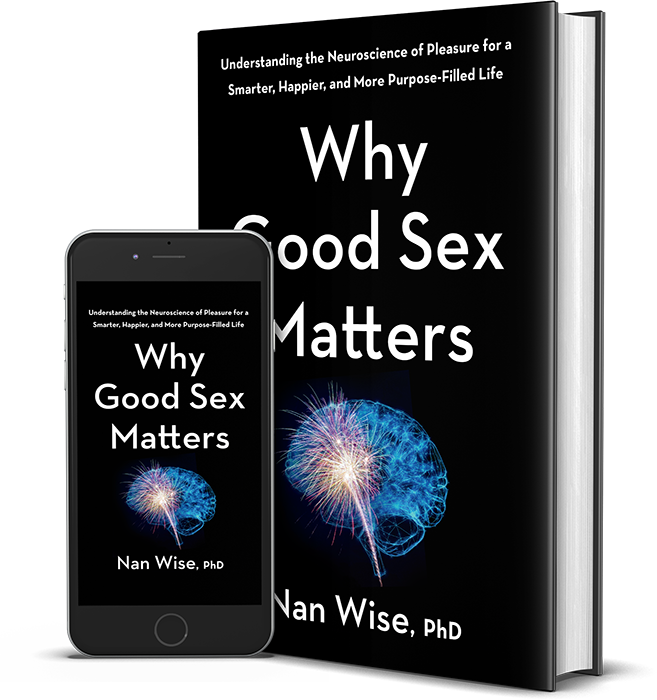Female Orgasm Disorder—or problems experiencing orgasm–is one of the most urgent and common concerns for which clients seek my services. It is the second most frequently reported sexual problem (with lack of sexual desire being number one) and is typically expressed with embarrassment when clients ask, “why can’t I come?”
Recent data indicate that 16-25% of women in places like the US, Australia, Canada, and Sweden report these challenges Because this problem is so vexing and so little is known about it, my research laboratory is currently extending our studies of what happens in the brain with orgasm to studying women who cannot orgasm at all.
Orgasmic dysfunctions can range from mild to severe
Anorgasmia is the technical term for problems experiencing orgasm.
“Mild” orgasmic dysfunction has been reported to affect up to 60% of women. That’s a whole lot of ladies.
Primary anorgasmia is when the person has never, ever had an orgasm.
Secondary or acquired anorgasmia is when one could previously orgasm but is no longer able to do so.
Common factors contributing to anorgasmia
The body isn’t sufficiently trained
In my clinical work, the most common cause of primary anorgasmia stems simply from insufficient practice masturbating. Without repeated practice to lay down the “orgasm pathways”, the sensory pathways from the genitals to the brain’s pleasure machinery are not sufficiently connected and strengthened to make orgasms accessible. A lack of information and understanding of female sexual anatomy doesn’t help. Once we can appreciate the magnificence of our erotic equipment, we can better operate it
The mind gets in the way
Learning plays a big role in our sexual dysfunctions. Women might not be as exuberant about learning how to masturbate or even be hampered in their willingness to experiment with having sex in the context of a culture that bombards us with conflicting and creepy messages about our sexuality. You should have a perfect body. You should be a sex object. But, if you are too into sex, or have too many partners, you are a slut.
Think shame, guilt, and fear here.
Beyond cultural programming, traumatic experiences around sexuality can shut down our ability to relax into sensations and feel comfortable with and entitled to have sexual pleasure. The trauma needn’t be extreme to imprint us with a blockage to letting go into the release of orgasmic delights.
For example, in my book, Why Good Sex Matters, I describe one of my client’s struggles with primary anorgasmia that stemmed from a long-forgotten incident that occurred when she was a kid. Her mom walked in while she was bathing and caught her touching her genitals when the soap slipped between her legs. The mom screamed, “don’t touch yourself” in a way that was uncharacteristically harsh. Put that together with a Catholic School education and what you got was a big fat orgasm blockage.
No matter how sophisticated or sex-positive your attitudes and beliefs at the top of your mind are, old sex-negative messages and experiences can trigger defenses and prevent us from relaxing into the erotic experience.
Women are often not comfortable asking for what they need in order to orgasm. This is largely related to fears about offending the partner or being seen as too assertive.
Substances can get in the way
Antidepressants like SSRIs (Paxil, Prozac, Lexapro, etc.) that affect the serotonin system can impair the ability to orgasm. So can too much alcohol. And cigarette smoking doesn’t help because it impairs blood flow.
Tips for working through obstacles to orgasm
For your body: Practice the radical act of self-loving
If anorgasmia is primary or persistent, masturbate. And while you are doing that, Kegel, Kegel, Kegel. A Kegel practice can be the single most powerful and effective tool in ramping up the orgasm machinery. Remember, you can’t play in a band until you learn how to play your own instrument. Helpful hint: Use a vibrator and don’t worry about getting addicted or diminishing your sensitivity. Laying down the pathways to connect your genitals and the sensory pathways that go up to the pleasure places in the brain will jump-start your orgasm factory
For your mind; Practice the radical art of self-acceptance
If you have been shamed about sex or have traumas big or small, talk to a sex therapist. The client who came in for treatment of primary anorgasmia was able to give herself permission to release into pleasure after recognizing how her bathtub shaming experience kept her from exploring her pleasure body. After a few sessions of unpacking this old learning, she was able to discover her orgasm after making good friends with a vibrator. And boy, was she ever happy she did.
If you used to be able to orgasm but can’t anymore, three important things to consider.
Biological-are you having hormone issues or taking new medications that might be impacting your sexual systems? Speak to your doctor.
Psychological: Are you too stressed out to relax into orgasm? If so, addressing your stress levels may do wonders for your sex life. Make this a priority. Healthy hedonism heals.
Social/Relational: What is the state of your intimate partnership? Conflict in relationships can be a big reason the orgasm becomes elusive. If you don’t feel safe with your partner or harbor big resentments, orgasms can be the causality. No quick fix, but taking our orgasm shut down as good information which can facilitate our having difficult but freeing conversations is a big part of creating ongoing sexual potential in partnerships. I write about this extensively in my book.
Finally, the paradox: Letting go of seeking the orgasm can help it find you.
Putting mind and body together to radically accept what is so, while celebrating your body, your senses, and your right to your sensations. And in the meantime, recognize that orgasms are not the be-all and end-all of the sexual world. Some women report orgasming easily but not feeling particularly satisfied, while others report satisfying levels of pleasure with or without the big O. Say yes to the experience you are having.



